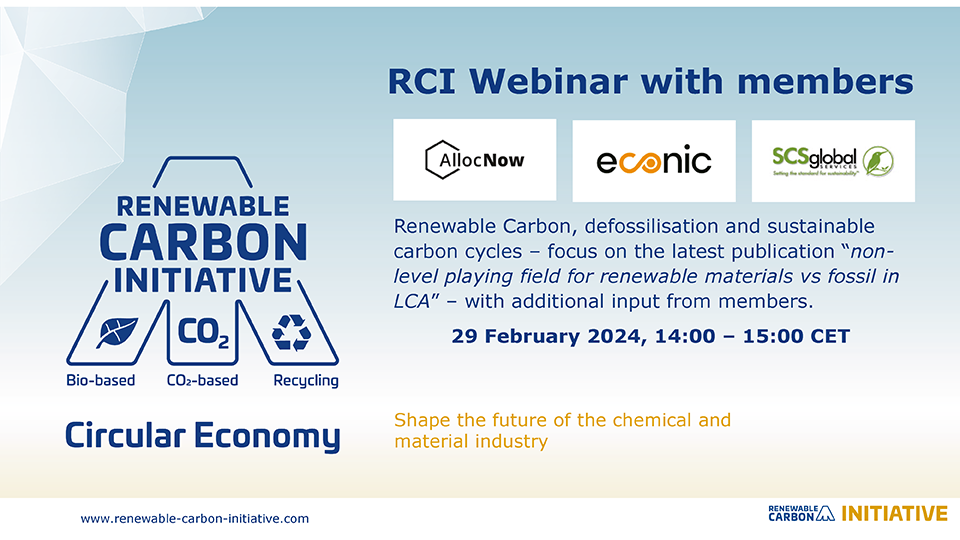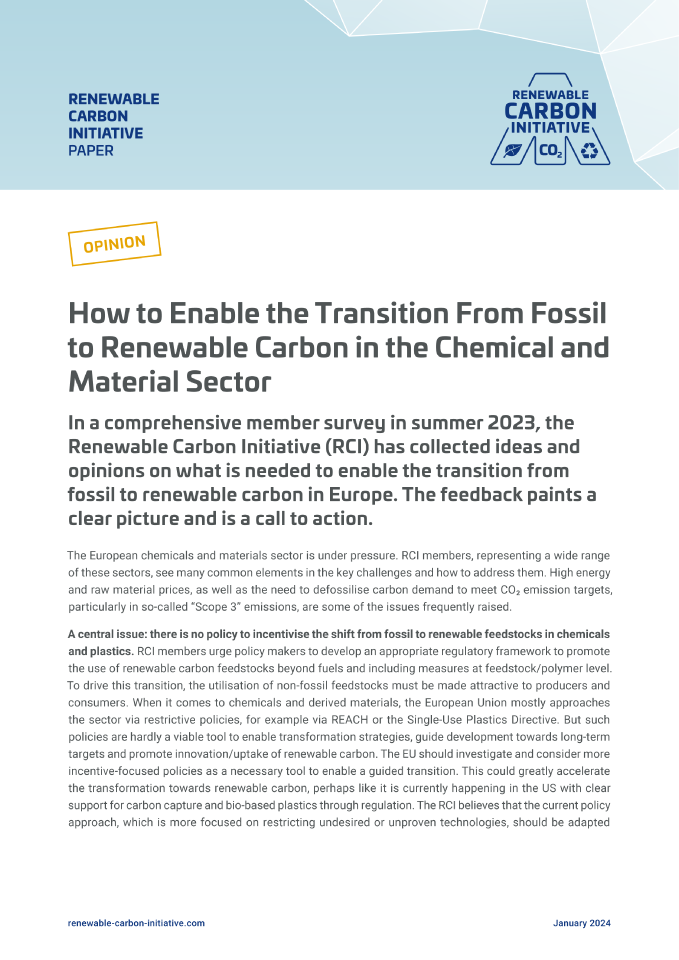Showing 61–80 of 238
-
European Bioeconomy in Figures 2014–2021 (PDF)
Markets & Economy, Policy, Sustainability & Health
29 Pages
828 Downloads
828 Downloads
2024-09
FREE
Free Shipping828
DownloadsThe bioeconomy in the European Union is a strong contributor to the overall economy and accounts for over 16 million employees and more than 2.3 trillion Euro in turnover across all 27 Member States. In terms of turnover almost half of the 2.3 trillion Euro can be attributed to the food and feed industries, which remain a large part of the EU bioeconomy. Adding to this are the agriculture and forestry sectors providing primary biomass to bioeconomic processes. However, the sectors processing these feedstocks and manufacturing intermediate and end-use products, collectively referred to as the bio-based industries, find themselves contributing on a stable level to the overall bioeconomy and account for almost a third of the overall turnover.
-
RCI’s position paper: “Swift implementation of EU biotech and biomanufacturing initiative is key to strengthen EU competitiveness and accelerate defossilisation (PDF)”
Markets & Economy, Policy, Sustainability & Health
3 Pages
474 Downloads
474 Downloads
2024-09
FREE
Free Shipping474
DownloadsThe Renewable Carbon Initiative’s position paper emphasizes that the EU must swiftly implement its biotechnology and biomanufacturing initiative to accelerate the shift from fossil carbon to renewable sources and boost competitiveness. The Renewable Carbon Initiative (RCI) highlights three key actions:
1.) Align with Circular Economy Policies: Ensure consistency across EU initiatives to promote renewable carbon from biomass, recycling, and CCU.
2.) Boost Market Demand: Address the lack of demand for renewable feedstocks by implementing policies to make fossil alternatives less competitive.
3.) Enable Fossil-to-Renewable Transition: Repurposing current fossil-based manufacturing to use renewable feedstocks. Clear sustainability criteria, access to various biomass sources, and broader definitions of biomanufacturing processes are essential to achieving this transition.
These actions are vital for achieving net-zero goals and strengthening EU industry.
-
Renewable Carbon Initiative (RCI) Webinar slides – July 2024 (PDF)
Policy, Sustainability & Health, Technology
60 Pages
510 Downloads
510 Downloads
2024-07
FREE
Free Shipping510
DownloadsThis document contains a generic set of slides to introduce the concept of renewable carbon and the Renewable Carbon Initiative. The focus of this webinar is the work and impact of the RCI. Moreover, Arndt Scheidgen, Head of Product Stewardship at Henkel Consumer Brands joined the webinar to give insights as an industry leader.
-
RCI’s position paper: “Towards an ambitious Industrial Carbon Management for the EU – A Call for Speedy and Coherent Implementation of Policy Measures (PDF)”
Markets & Economy, Policy, Sustainability & Health
3 Pages
498 Downloads
498 Downloads
2024-07
FREE
498
DownloadsThe Renewable Carbon Initiative’s position paper emphasizes the need for a comprehensive industrial carbon management strategy in the EU that goes beyond CO2 emissions to include all carbon sources, promoting the use of renewable carbon from biomass, CCU, and recycling. It calls for the establishment of a regulatory framework with specific sub-targets and incentives by 2025 to accelerate the adoption of circular carbon technologies and reduce dependence on fossil feedstocks. The paper argues that recognising carbon as a raw material is essential for achieving sustainable carbon cycles and meeting the EU’s climate neutrality goals by 2050.
-
Joint Statement PEF TAB – biogenic carbon modelling (PDF)
Markets & Economy, Policy, Sustainability & Health
4 Pages
502 Downloads
502 Downloads
2024-06
FREE
502
DownloadsThe RCI along with the organisations APAG Oleochemicals Europe, Bio-based Industries Consortium, BioChem Europe, EuropaBio, GO!PHA, IKT Kunststofftechnik Stuttgart and Plastics Europe submitted this Joint Statement to the members of the Technical Advisory Boyard of the Product Environmental Footprint (PEF TAB). The purpose of this submission is to address the ongoing discussions on carbon modelling in the EF, which have been frequently discussed in recent PEF TAB meetings. With this joint statement we advocate for enabling -1/+1 accounting of biogenic and atmospheric carbon in the LCA methodology.
-
Renewable Materials Conference 2024 (Proceedings, PDF)
Markets & Economy, Policy, Sustainability & Health, Technology

2024-06
200 € ex. tax
Plus 19% MwSt.Press
release Add to
cartThe proceedings of the Renewable Materials Conference 2024 (11-13 June 2024, https://renewable-materials.eu) contain all released presentations, the conference journal, and the press release of the three winners of the Innovation Award “Renewable Material of the Year 2024″.
-
Mass Balance & Attribution With Fuel-use Excluded (PNG)
Markets & Economy, Policy, Sustainability & Health, Technology
1 Page
291 Downloads
291 Downloads
2024-06
FREE
291
DownloadsThe graphic shows the approach of mass balance and attribution with fuel-use excluded which allows to track the fossil and recycled share of feedstock. The recycled content can be attributed to products after deducting lossess and proess energy during production and, if applicable, produced energy carriers (fuel-use excluded). This approach ensures that a transparent amount of fossil feedstock is replaced by recycled feedstock in the production process and that only recycled feedstock that actually ends up in products can be attributed.
-
Ein Plädoyer für Carbon Capture and Utilisation – Carbon Capture and Utilisation ist viel mehr als nur eine Technologie zur Entnahme von Kohlenstoffdioxid (PDF)
Markets & Economy, Policy, Sustainability & Health
4 Pages
401 Downloads
401 Downloads
2024-06
FREE
401
DownloadsZur Eindämmung des Klimawandels ist eine drastische Reduzierung fossiler Kohlenstoffemissionen erforderlich. Während Energie- und Verkehrssysteme dekarbonisiert werden können, benötigen Chemie- und Werkstoffsektoren Kohlenstoff als Rohstoff. Diese Sektoren sollten auf erneuerbaren Kohlenstoff aus Biomasse, CCU und Recycling umsteigen, wie von der Renewable Carbon Initiative (RCI) gefördert.
CCU bietet zahlreiche Vorteile, darunter die Defossilisierung der Industrie und die Reduzierung der Treibhausgasemissionen.
Trotz ihrer Bedeutung wird CCU politisch noch nicht ausreichend anerkannt. Eine stärkere Unterstützung und der Einsatz erneuerbarer Energien sind notwendig, um CCU als Schlüssel- technologie für eine nachhaltige Zukunft zu etablieren.
Weitere Informationen:
https://www.chemanager-online.com/news/ein-plaedoyer-fuer-carbon-capture-and-utilisation
-
Breaking news – Milestone for the Transition to Sustainable Carbon in the European Chemical Industry (PDF)
Policy
4 Pages
110 Downloads
110 Downloads
2024-05
FREE
Free Shipping110
DownloadsOn 16 April 2024, a major milestone was reached in the European chemical industry’s transition to sustainable carbon.
A group of four EU member states – the Netherlands, France, Ireland and the Czech Republic – are proposing an overarching long-term European policy framework to the European Commissioner for Climate Action, Wopke Hoekstra, who has warmly welcomed the initiative. The joint statement aims to achieve a transition from fossil to sustainable carbon feedstocks in the chemical industry.
More supportive Member States are expected to join this proposal soon, as it provides a clear pathway without alternative to ensure the transition towards a modern and globally competitive chemical industry in Europe – which at the same time can also achieve sustainability and net-zero targets. The Joint Statement is a milestone and a significant opportunity to limit Europe’s external dependencies while moving closer to our European climate and environmental goals.
-
Call for Member States to support an EU Sustainable Carbon Policy Package as a part of a future green EU Industrial Deal (PDF)
Markets & Economy, Policy, Sustainability & Health
2 Pages
418 Downloads
418 Downloads
2024-05
FREE
Free Shipping418
DownloadsThe signatories of this proposal urge Member States to support the EU Sustainable Carbon Policy Package for the 2024-2029 term of the European Commission.
The Netherlands, the Czech Republic, France, and Ireland are advocating for an EU Sustainable Carbon Policy Package to transition the chemicals sector from fossil carbon to sustainable sources. This proposal, to be discussed at the Competitiveness Council on May 24, aims to enhance EU competitiveness, achieve climate targets, and secure raw material supplies by developing sustainable carbon markets and promoting innovative technologies. The initiative aligns with the Antwerp Declaration, the Enrico Letta Report, and the European Council Conclusions, and seeks to support job creation, industry growth, and climate neutrality.
-
Biodegradable Plastics PLA and PBAT Production Capacity 2021-2025 – Graphic (PNG)
Markets & Economy, Policy, Sustainability & Health
1 Page
44 Downloads
44 Downloads
2024-05
FREE
44
Downloads -
Bio-based and Biodegradable Plastics Industries in China – Short Version (PDF)
Markets & Economy, Policy, Sustainability & Health
14 Pages
1232 Downloads
1232 Downloads
2024-05
FREE
1232
DownloadsChina has emerged as a global leader in strategic technologies such as 5G, renewable energy, and electric vehicles in the past two decades. This dominance may leave European companies impressed and concerned about competition while also sparking curiosity about China’s leapfrogging advancement in these areas.
Paving the way to a net-zero chemical industry in 2060, using renewable biomass to produce bio-based chemicals has been one of the promising transitional solutions for the global chemical industry. As China and Europe strive to follow this path, a similar question may exist within the European chemical industry: What is the status of the bio-based industry in China? Can China and Europe find a cooperative and win-win way to develop this industry?
-
Bio-based and Biodegradable Plastics Industries in China (PDF)
Markets & Economy, Policy, Sustainability & Health
71 Pages

2024-05
1,500 € – 8,000 €Price range: 1,500 € through 8,000 € ex. tax
Plus 19% MwSt.Press
release Select
licenceChina has emerged as a global leader in strategic technologies such as 5G, renewable energy, and electric vehicles in the past two decades. This dominance may leave European companies impressed and concerned about competition while also sparking curiosity about China’s leapfrogging advancement in these areas.
Paving the way to a net-zero chemical industry in 2060, using renewable biomass to produce bio-based chemicals has been one of the promising transitional solutions for the global chemical industry. As China and Europe strive to follow this path, a similar question may exist within the European chemical industry: What is the status of the bio-based industry in China? Can China and Europe find a cooperative and win-win way to develop this industry?
-
Bioplastics Production Capacity in China 2019–2026 – Graphic (PNG)
Markets & Economy, Policy, Sustainability & Health
1 Page
51 Downloads
51 Downloads
2024-05
FREE
51
Downloads -
RCI Position Paper on Chemical and Physical Recycling (PDF)
Policy, Technology
4 Pages
989 Downloads
989 Downloads
2024-05
FREE
Free Shipping989
DownloadsIn this position paper, the RCI describes that chemical and physical recycling play essential roles in realising the objectives of the Green Deal and advancing the circular economy. These technologies are indispensable for the green transition.
This position paper identifies eleven requirements to create secure demand, drive investment and further improve the technology field. These include general acceptance of the technology; mandatory recycled content for all polymers/plastics in all applications; recognition and clarification of rules for the calculation of recycling rates; full acceptance of mass balance & attribution with fuel-use excluded; accelerated approval of new chemical and physical recycling facilities; expansion of recycling infrastructure for all sectors beyond packaging; and the extension of CO2 pricing for waste incineration in the ETS combined with a landfill ban.
Additionally, RCI advocates for a pragmatic approach, emphasising that while closed-loop recycling is a noble goal for sectors such as packaging, textiles and automobiles, it should not be approached too dogmatically. Flexibility is essential to prevent environmental and economic inefficiencies. If the waste stream of one sector can be better used in another, this should be possible.
-
Renewable Carbon Initiative (RCI) Webinar slides – April 2024 (PDF)
Markets & Economy, Policy, Technology
43 Pages
212 Downloads
212 Downloads
2024-05
FREE
Free Shipping212
DownloadsThis document contains a generic set of slides to introduce the concept of renewable carbon and the Renewable Carbon Initiative. The focus of this webinar was the upcoming position paper on Chemical and Physical Recycling.
-
CO2-based Fuels and Chemicals Conference 2024 (Proceedings, PDF)
Markets & Economy, Policy, Sustainability & Health, Technology

2024-05
50 € ex. tax
Plus 19% MwSt.Press
release Add to
cartThe proceedings of the CO2-based Fuels and Chemicals Conference 2024 (17-18 April 2024, https://co2-chemistry.eu) contain all released presentations, the conference journal, and the press release of the three winners of the Innovation Award “Best CO2 Utilisation 2024″.
-
Cellulose Fibres Conference 2024 (Proceedings, PDF)
Markets & Economy, Policy, Sustainability & Health, Technology

2024-04
50 € ex. tax
Plus 19% MwSt.Press
release Add to
cartThe conference covered the entire value chain, from lignocellulose, chemical pulp, cellulose fibres such as rayon, viscose, modal or lyocell and new developments to a wide range of applications:
Textiles from renewable fibres, non-wovens such as wet wipes as well as new areas such as composites, hygiene, packaging or nanocellulose in the food industry. The conference offered deep insights into the promising future of cellulose fibres, which perfectly fits the current trends of circular economy, recycling and sustainable carbon cycles.The Cellulose Fibres Conference Proceedings (https://cellulose-fibres.eu, 13-14 March 2024, Cologne, hybrid) include all released conference presentations, the conference journal, sponsor documents, a Fiber2Fashion Knowledgepaper and the conference press release.
-
Renewable Carbon Initiative (RCI) Webinar slides – February 2024 (PDF)
Policy, Sustainability & Health
61 Pages
1769 Downloads
1769 Downloads
2024-02
FREE
Free Shipping1769
DownloadsThis document contains a generic set of slides to introduce the concept of renewable carbon and the Renewable Carbon Initiative. The focus of this webinar was the latest scientific background report: “Non-level Playing Field for Renewable Materials vs. Fossil in Life Cycle Assessments – Critical aspects of the JRC Plastics LCA methodology and its policy implications”.
In addition, three RCI member companies shared their expertise on renewable carbon, defossilisation and sustainable carbon cycles.
AllocNow (speaker: Daniel Bochnitschek) talked about how the increasing demand for sustainable and low carbon products is driving the need for specific and comprehensive information on product carbon footprints. AllocNow discussed why standardisation of sustainability accounting methodologies is critical and how a data-driven approach can help create transparency at scale.
Econic Technologies Ltd. (speaker: Liz Manning) spoke about the opportunities and challenges of quantifying the sustainability impact of key products in complex manufacturing supply chains.
SCS Global Services (speakers: Miguel Ruiz and Jéssica Marcon Bressanin) highlighted its certification activities, focusing on biofuels and circular materials schemes, as well as greenhouse gas accounting methodologies.
More information at https://renewable-carbon-initiative.com/media/library
-
RCI’s Internal Survey: „How to enable the transition from fossil to renewable carbon in the chemical and material sector“ (January 2024)
Policy, Sustainability & Health
3 Pages
665 Downloads
665 Downloads
2024-01
FREE
665
DownloadsIn a comprehensive member survey in summer 2023, the Renewable Carbon Initiative (RCI) has collected ideas and opinions on what is needed to enable the transition from fossil to renewable carbon in Europe. The feedback paints a clear picture and is a call to action.
The European chemicals and materials sector is under pressure. RCI members, representing a wide range of these sectors, see many common elements in the key challenges and how to address them. High energy and raw material prices, as well as the need to defossilise carbon demand to meet CO2 emission targets, particularly in so-called “Scope 3” emissions, are some of the issues frequently raised.

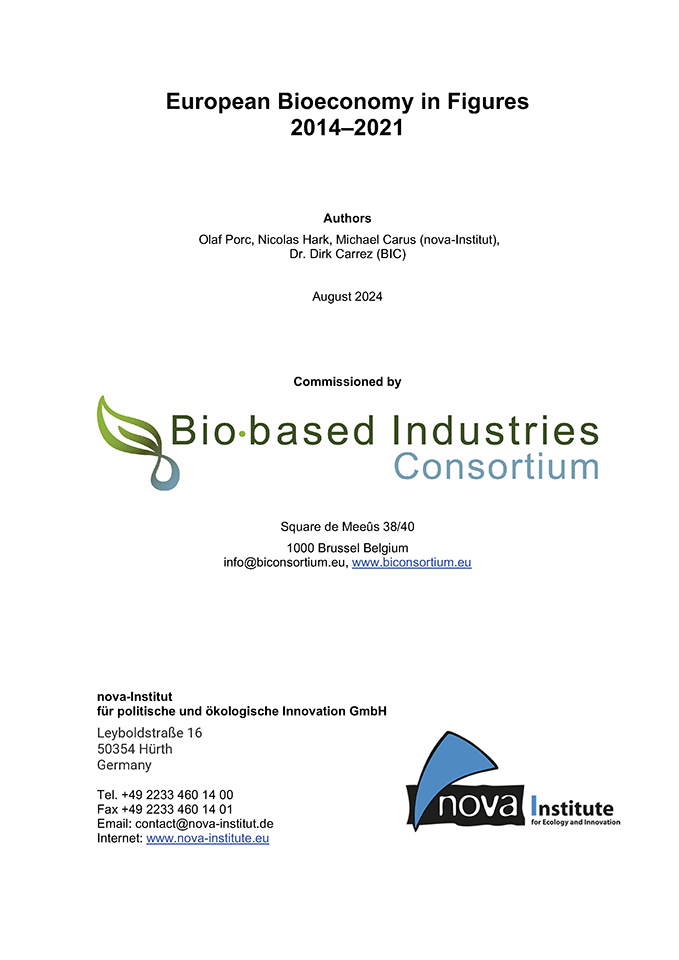
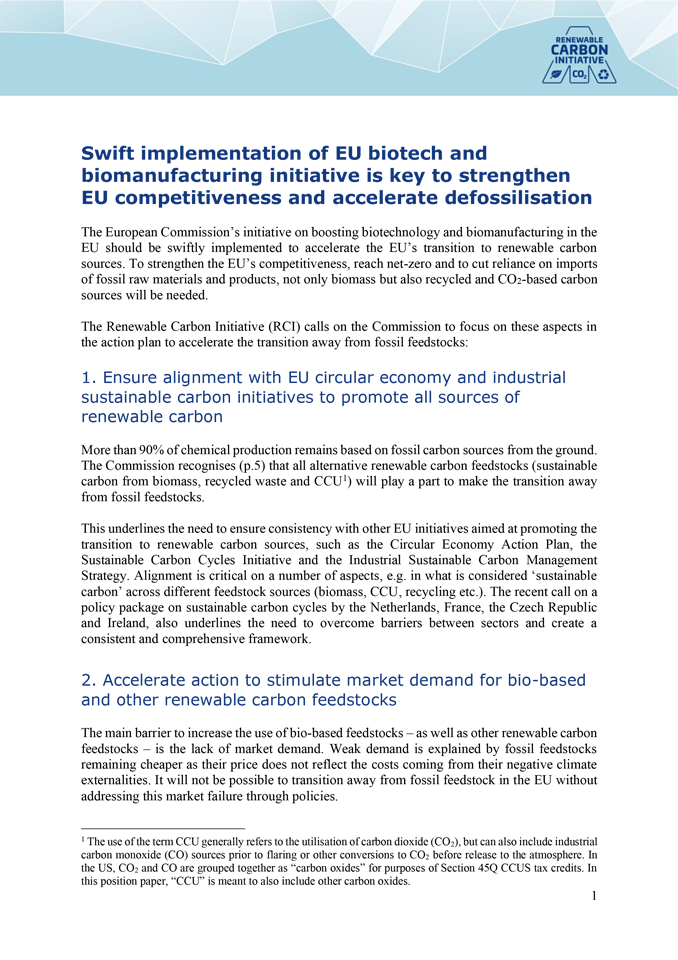
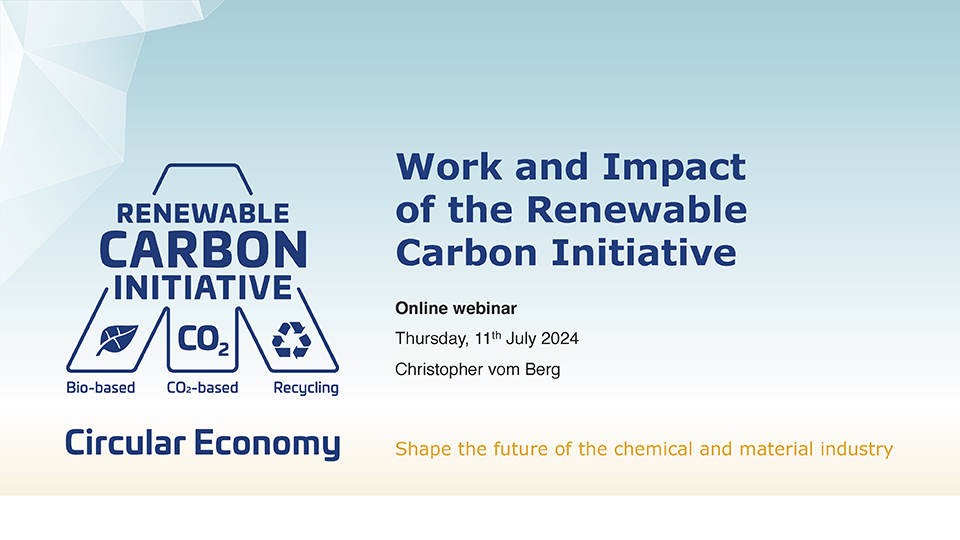
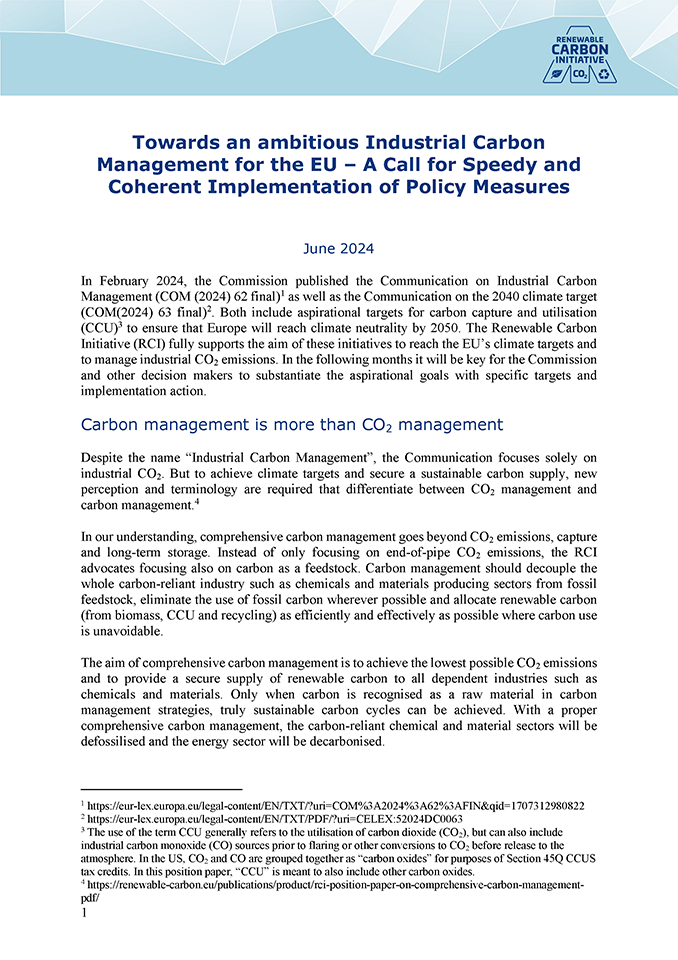
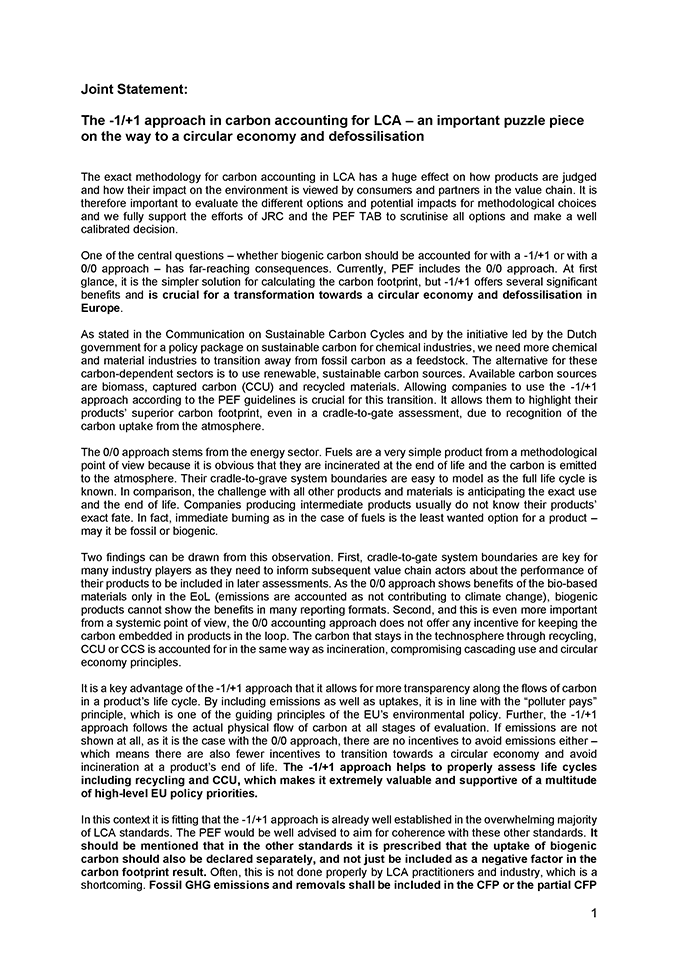
![Renewable Materials Conference 2024 (Proceedings, PDF) [Digital]](https://renewable-carbon.eu/publications/wp-content/uploads/2020/05/21-01-07_RC-Publications-Cover-Proceedings_RMC-100x141.png)
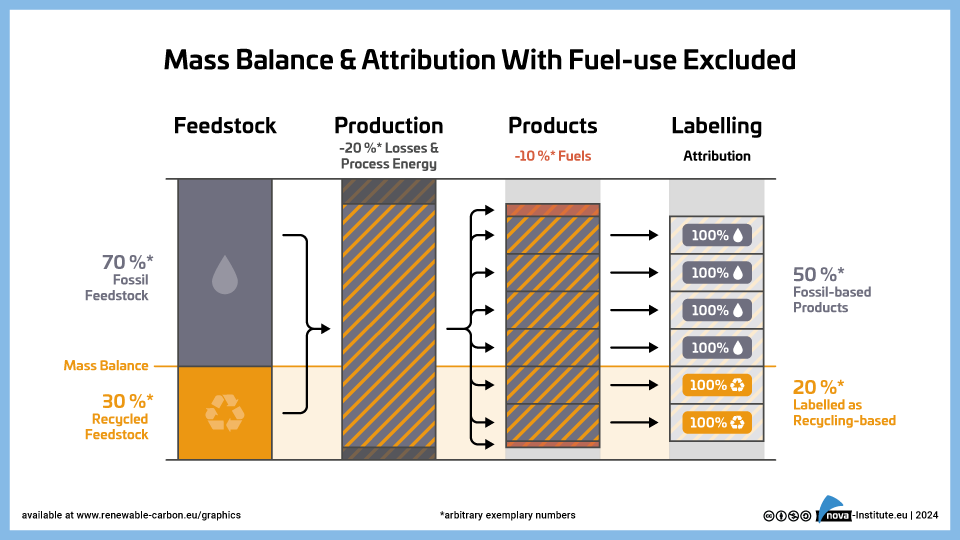
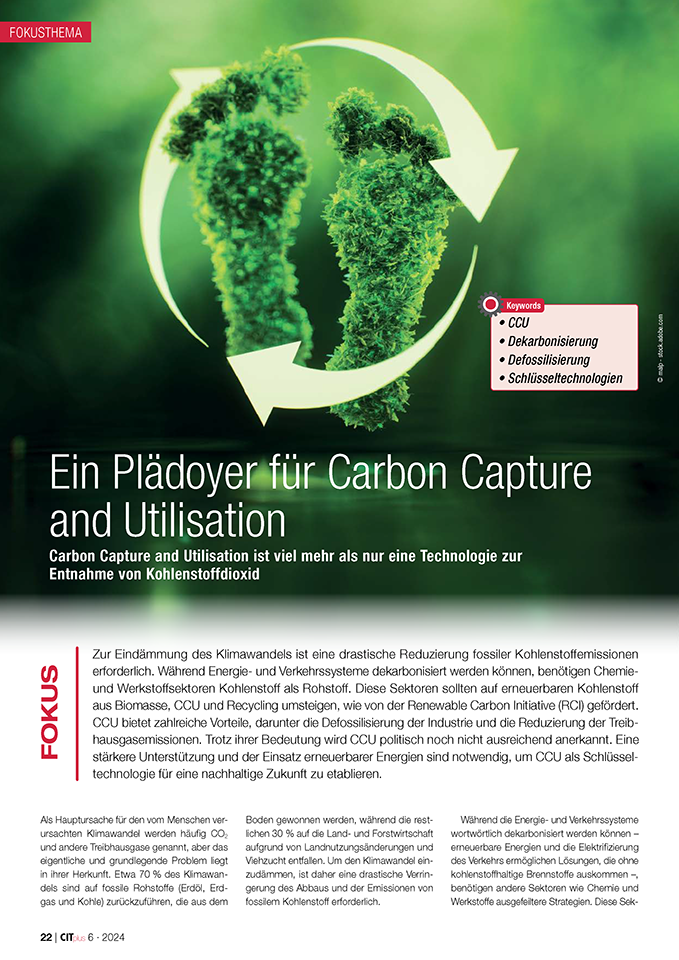
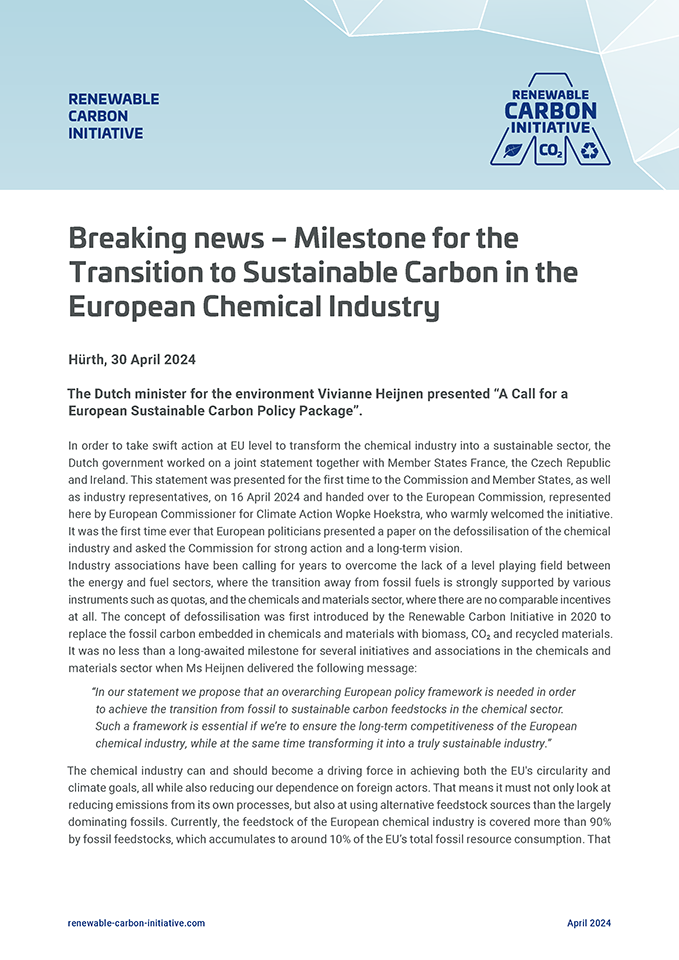
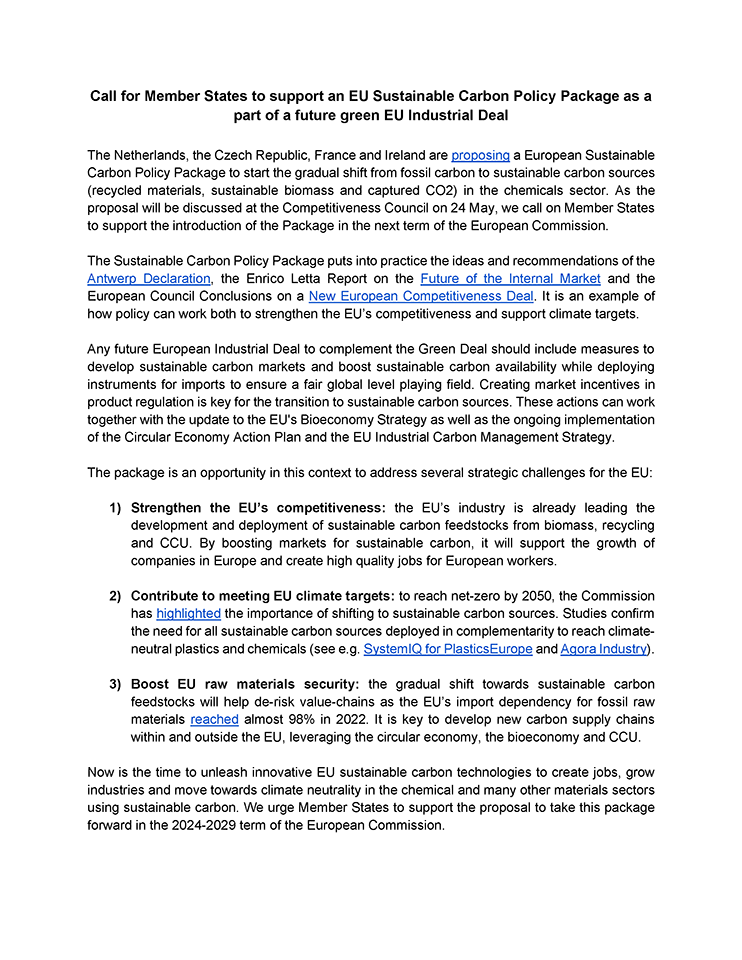
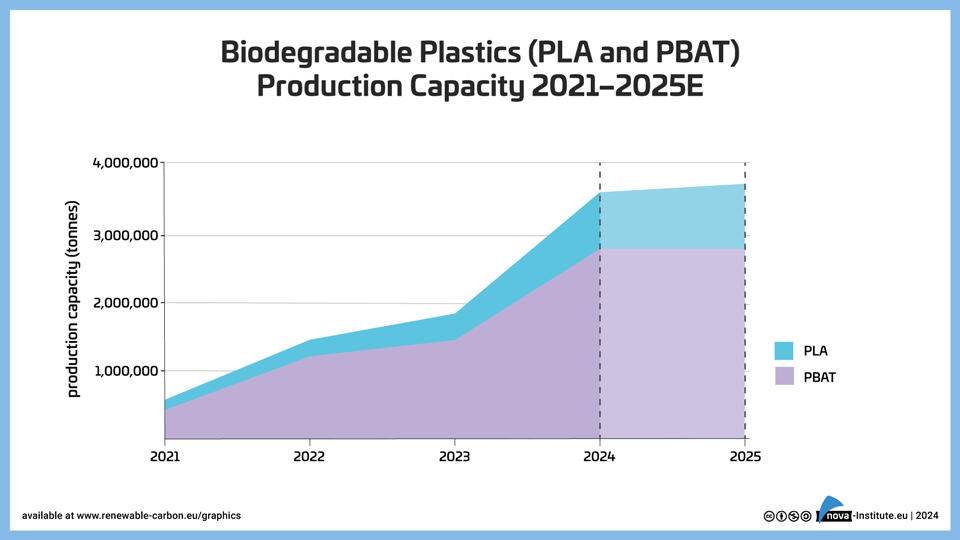
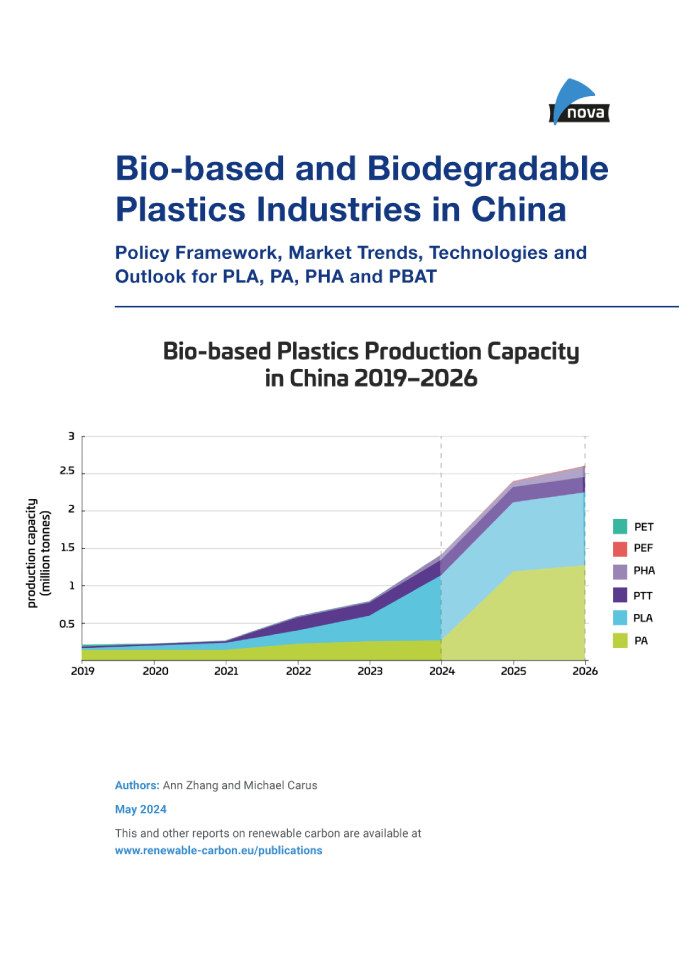
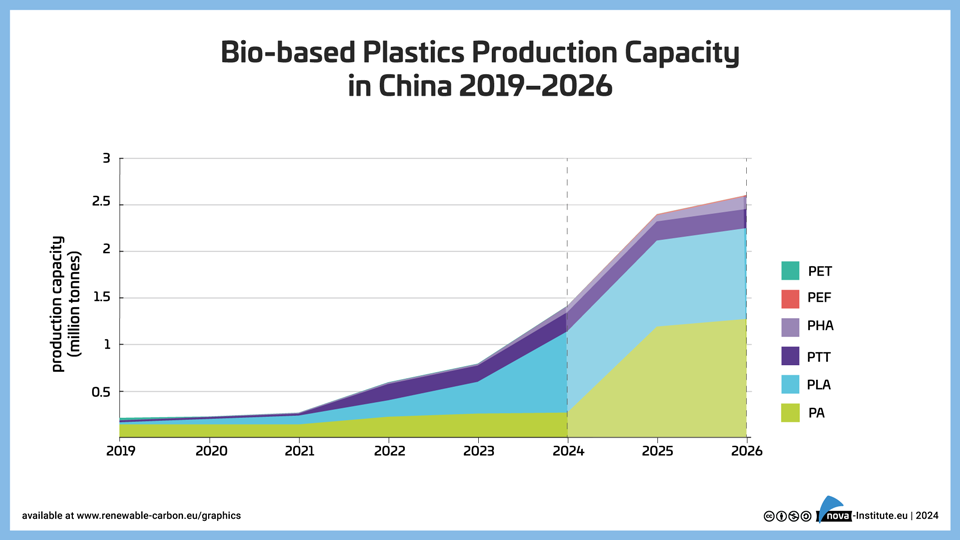
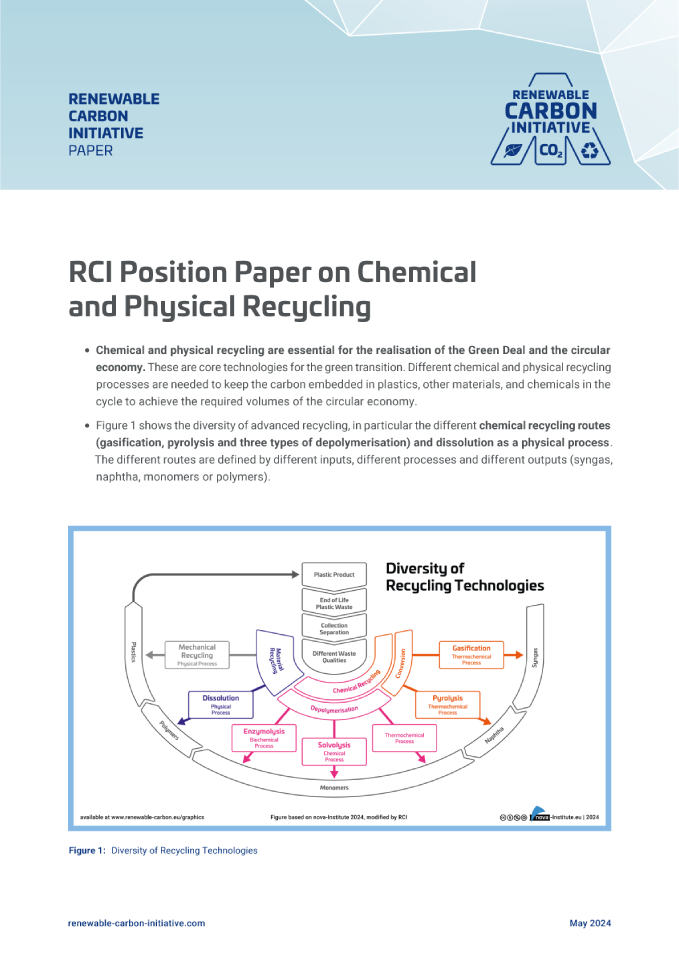
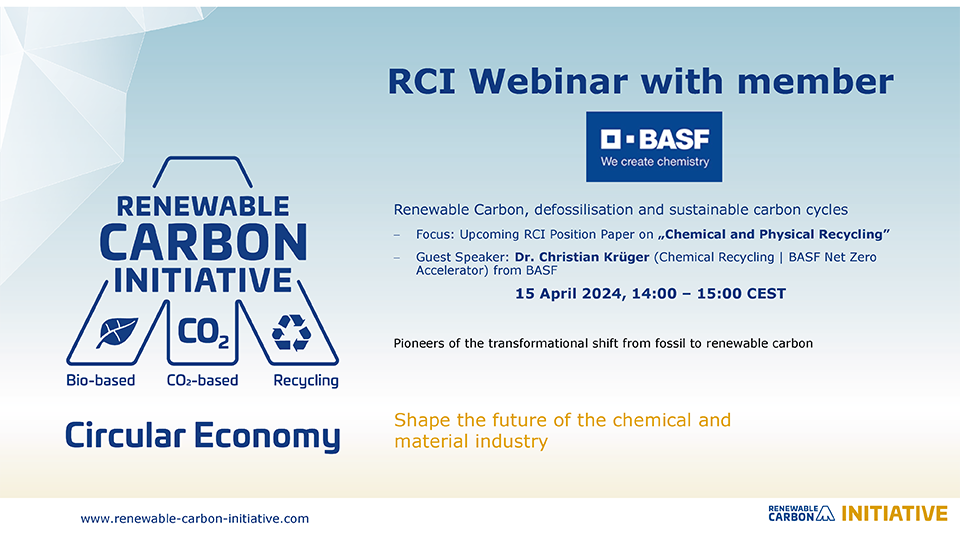
![CO2-based Fuels and Chemicals Conference 2024 (Proceedings, PDF) [Digital]](https://renewable-carbon.eu/publications/wp-content/uploads/2020/05/21-01-07_RC-Publications-Cover-Proceedings_CO2-based-100x141.png)
![Cellulose Fibres Conference 2024 (Proceedings, PDF) [Digital]](https://renewable-carbon.eu/publications/wp-content/uploads/2020/05/21-01-07_RC-Publications-Cover-Proceedings_Cellulose-Fibres-100x141.png)
